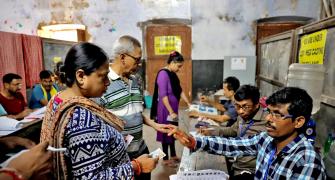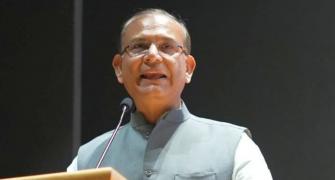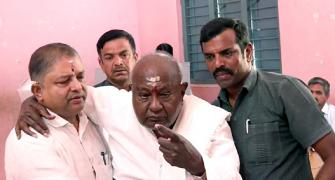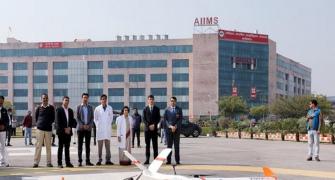 Delhi Chief Minister Arvind Kejriwal has shown once again that a political party once mandated to ensure governance cannot act the same way it did before assuming power, says A K Bhattacharya
Delhi Chief Minister Arvind Kejriwal has shown once again that a political party once mandated to ensure governance cannot act the same way it did before assuming power, says A K Bhattacharya
Delhi Chief Minister Arvind Kejriwal has been accused of having broken the promise he made to the people. Not once or twice, but thrice. His party, the Aam Aadmi Party or the AAP, had made a promise to the voters before the Delhi assembly polls in February that if elected to power it would reduce water and power tariffs.
But less than a month after the AAP's thumping victory in the elections and the formation of the government, water tariffs were raised by 10 per cent. Then in June, power tariffs increased by up to six per cent. And, finally, within days of claiming that the Kejriwal government's first budget had no new taxes, it raised the value added tax or VAT on petrol and diesel by 4-5 percentage points.
Before one jumps on Kejriwal for letting down the electorate, all the three decisions need to be placed in an appropriate context. Water tariffs were indeed raised by 10 per cent, but with a crucial rider.
The increase affected only those households that had a monthly consumption level of more than 20,000 litres or a little less than 700 litres per day. Now, take a look at the pattern of water consumption in Delhi.
The per capita daily consumption of water in almost three-fourths of households in Delhi is 30 litres, while the daily consumption is many times more in affluent households. The average daily water consumption in five-star hotels in Delhi is said to be over 1,000 litres per day per room.
So, the impact of the higher tariff was felt only on a relatively tiny section of the economically well-off population that certainly did not need or deserve to enjoy a subsidised tariff for consuming water.
Moreover, a recent study estimates the average daily requirement of water at 135 litres per person. For a family of five in a household, therefore, water consumption would be less than 700 litres a day.
In other words, the 10 per cent increase in tariffs should not affect households that keep their average daily consumption below that level. A tariff increase of that order would also keep a check on wastage of water and encourage households to stay within that limit in a monthly cycle.
But what happened to electricity? Yes, the power tariff in Delhi also increased by up to six per cent and for all categories of consumers. However, this was because the electricity regulator had mandated the upward tariff revision based on its own assessment of the costs incurred by the power distribution companies.
The AAP government has sought a review of this order and that is all it can do under the prevailing rules. Separately, the state government has also initiated a move to secure compensation from the distribution companies for any unscheduled disruption in power supplies to consumers.
The focus, thus, seems to be on improved power supply without being mulish in opposing any power tariff hike that is mandated under the rules. As the old saying goes, the proof of the pudding is in the eating. The Kejriwal government will complete six months in office next month.
The state of power supply in Delhi has seen no deterioration even during the summer months.
There have been no instances of knee-jerk reaction to bring down power tariffs either. Instead, the annual subsidies being offered to power consumers below a specified threshold have been capped at Rs 1,700 crore, which the government claims has been mobilised through increased revenue collection.
It is also true that the Delhi government has smartly raised VAT on petrol and diesel to collect an additional Rs 548 crore on an annualised basis.
The additional tax collection is a small amount compared to the Delhi government's total VAT collection of around Rs 21,000 crore a year, but it nevertheless is an intelligent move because in spite of the extra levy, there is no effective increase in the retail prices of petrol and diesel.
Even as the central oil marketing companies reduced prices in line with the downward movement of international crude oil prices, the Delhi government moved in swiftly to increase its VAT rate on them by a margin that took the prices up to the same level that prevailed earlier.
This reduced the chances of a prolonged popular protest and minimised its impact on the consumers' pockets. In addition, the increase in VAT has helped align the prices of petrol and diesel in Delhi to those prevailing in the adjoining states of Uttar Pradesh and Haryana.
This is likely to eliminate the arbitrage opportunity and also prevent diversion of these petroleum products from Delhi to the adjoining states for private gains.
Understanding the context of these developments reveals a hitherto unknown face of the Kejriwal government.
It does not seem to be unduly worried over breaking promises, as long as the steps it takes do not rattle its core constituency comprising the economically weaker sections of society and they help the government mobilise resources necessary for implementing its larger plan of providing better education and health facilities.
Note that the Kejriwal government's Budget presented last month has doubled its outlay for education and raised its spend on health by 45 per cent, which among other things would see the addition of 10,000 new hospital beds in the state.
It also plans to set up 1,000 clinics, which will function as peripheral healthcare units to provide medical facilities to people belonging to economically weaker sections. This would mean about 15 such clinics in each of the 70 constituencies in Delhi.
In addition, it plans to set up canteens where nutritious food can be served at a reasonable price like many other states have already launched with considerable success.
The increased outlay for these sectors will require more resources and the Kejriwal government has thus focused on mobilising more revenues -- partly through higher tariffs and taxes and party through improving efficiency in tax collection.
Mr Kejriwal has shown once again that a political party once mandated to ensure governance cannot act the same way it could afford to do before assuming power.









